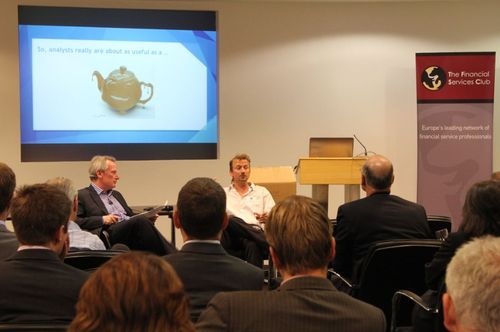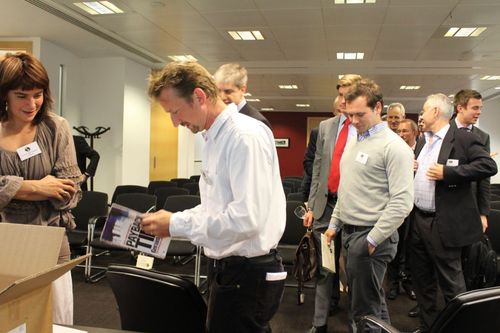
We had a fun evening last week at the Financial Services Club with Geraint Anderson, aka Cityboy, who gave us an amusing insight packed full of anecdotes into life in his City trading days.

Geraint Anderson began his career as a utilities analys with ABN AMRO before moving via Société Générale and Commerzbank to Dresdner Kleinwort in 2000, where he was named top stock-picker two years running.
His team became number two in the utilities sector with Anderson personally judged the fourth highest-ranked analyst (out of around 100).
Gearint gave it all up in 2008, after writing a column in the London paper called Cityboy, which went on to become a best-selling book.
So his stories about the City are admittedly pre-crisis but Geraint claims that not a great deal has changed.
Talking with his trading mates, who are still in the City, they tell him that life is treating them fine and they are sleeping like babies.
He was a little surprised to hear such views, but was cheered when they explained that this meant they woke up every two hours in the night pooing their pants!
The trading world that he portrayed is the same you will find if you read other trading room page turners, like Michael Lewis’s Liar’s Poker or Jordan Belfort’s the Wolf of Wall Street (currently being made into a movie starring Leonardo DiCaprio and directed by Martin Scorsese).
Namely, it’s a testosterone fuelled alpha male inhabited jungle where you get rich, get eaten or get out.
Geraint learned such challenges on his first day in the trading room when a whale of a trader – not The Whale - came up to him and, realising that Geraint is Welsh, boomed across the trading room: “What do you call three sheep tied to a post in Wales?” to which Geraint gamely responded “a leisure centre”.
Having held his own, he was accepted.
That’s the thing about the trading room – one-upmanship is rife, and you’re either the winner or the loser, but never neutral.
That’s why the focus is purely upon trying to make as much money as possible because good times always come to an end, and the trading room is where the young bucks make a few millions for a few years, then get burnt out and thrown out.
It is why there is such an arrogant swagger amongst the young masters of the universe who, as one was quoted, would say: “if I had been paid £10,000 every time someone said the good times were coming to an end, then I would be almost as rich as I am”.
In the City, the trading room is all about liquidity, volume and volatility. A long term investment is just a short term investment that went wrong, and clients would turn and churn their investments over two, three or four times a day.

Geraint admitted that he himself managed to convince a client to buy and sell a particular stock all in the space of thirty five minutes.
That’s good business!
However, the business is based upon an asymmetrical risk model created when the private partnerships become public firms.
As Goldman, Morgan and the rest turned into public firms at the end of the 1990s, the capital injection you personally placed at risk to become a partner disappeared.
However, the culture of selling and buying did not.
So now you had traders who would win if they got their risks right, but would not lose if they got them wrong.
That’s where the City went wrong.
It is why traders could go out and infect the global markets with a trillion dollars of toxic debt without worries, as this was logical.
If you got three or four big bonuses and were then thrown out, it gave you enough to sit on a beach for the rest of your life, so why wouldn’t you do it?
Equally, insider trading is rife.
You only have to look at the Finanser’s Things Worth Reading on a daily basis to realise this. Here’s just a few examples from the last week or two:
- Insider dealing trio sentenced to over five years - The Telegraph
- Ex-Goldman director Gupta found guilty of insider trading - The Independent
- Allen Stanford jailed for 110 years in prison for $7bn Ponzi scheme - The Telegraph
- City lawyer jailed after stealing £1.2m - The Independent
And, like our debate of the previous week, Geraint was building a strong picture of the fact that greed and corruption is rife in the City.
The reason is that insider trading is a way of making money without any likelihood of being caught and, even if you are, it is extremely unlikely that you will be punished for it.
For example, from 2006 to 2009, unusual share price movements preceded 30% of all UK mergers and acquisitions, a statistic that stubbornly refused to budge until the FSA started bringing cases to court. That’s why we’re seeing so many more cases today.
This is where Geraint made it clear that things are changing – back to the sleeping like a crying baby stuff – as rules are cracking down on these illegal practices.
Last year, the share of deals preceded by unusual trading dropped by a third to 20%. “The message to the market is clear. Market professionals in possession of privileged information need to behave accordingly,” says Patrick Spens, FSA head of market monitoring. “This is not difficult to understand.”
Geraint concluded that his trading colleagues today tell him that life has changed in three fundamental ways: it’s not as much fun; there’s not as much money; and compliance and audit are a non-stop hassle.
Good.
We finished the evening with a book signing session.

If you’re interested in knowing more about the City and the Cityboy, you too can read Geraint’s books:
Chris M Skinner
Chris Skinner is best known as an independent commentator on the financial markets through his blog, TheFinanser.com, as author of the bestselling book Digital Bank, and Chair of the European networking forum the Financial Services Club. He has been voted one of the most influential people in banking by The Financial Brand (as well as one of the best blogs), a FinTech Titan (Next Bank), one of the Fintech Leaders you need to follow (City AM, Deluxe and Jax Finance), as well as one of the Top 40 most influential people in financial technology by the Wall Street Journal's Financial News. To learn more click here...

